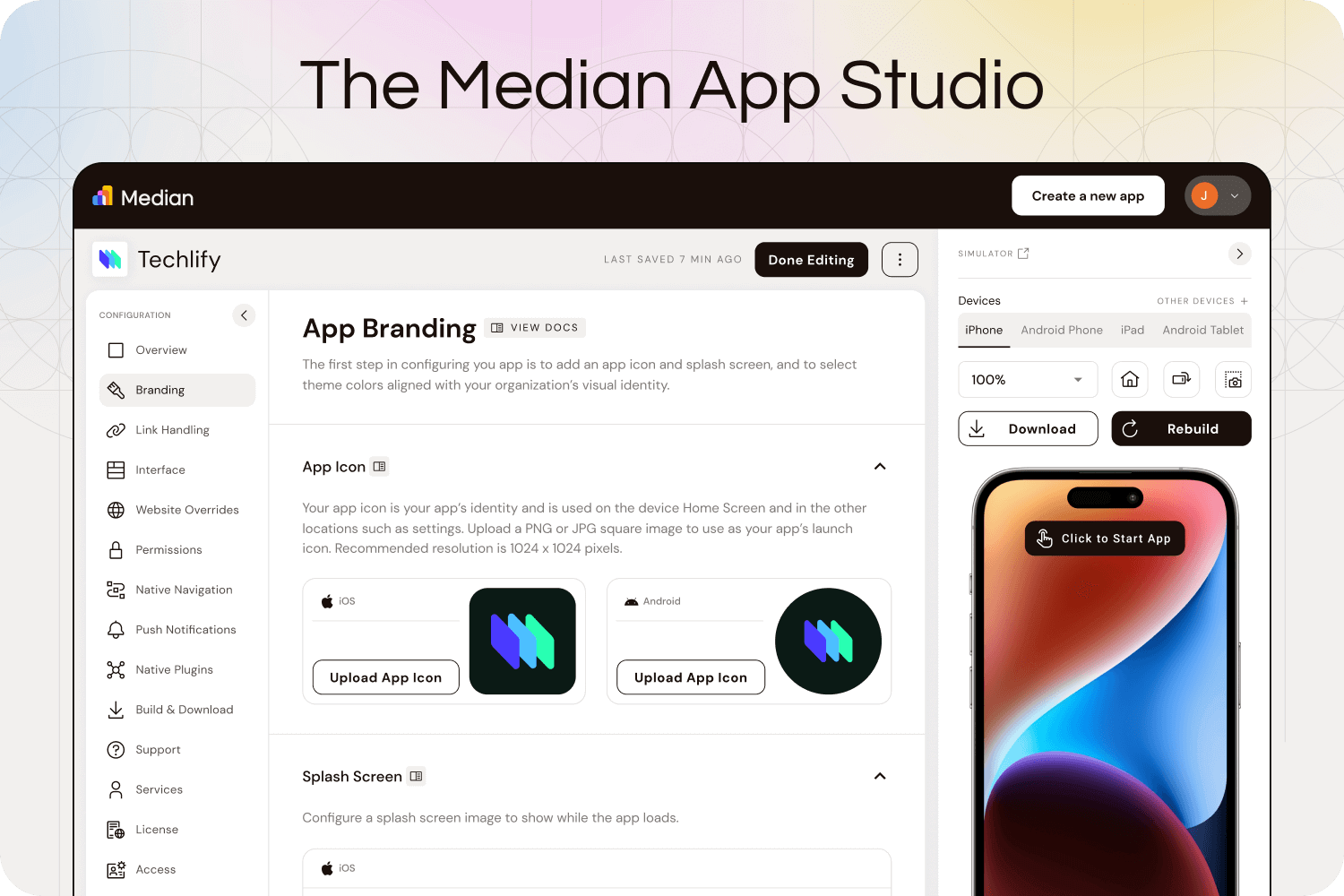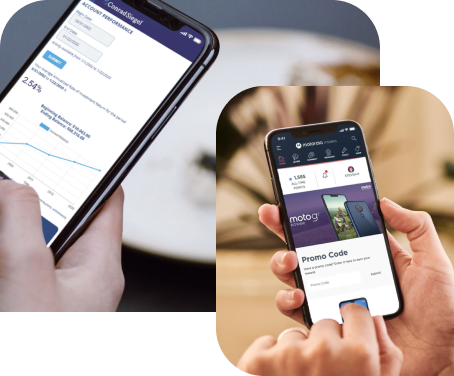How to choose the best no-code app builder in 2023
How to choose the best no-code app builder in 2023
No-code and low-code app builders are revolutionizing the way apps can be built, maintained, and deployed without requiring high-cost professional developers or coding knowledge.
Specifically, no-code platforms enable businesses to deliver full-feature mobile apps quickly, and without prior development experience. This is especially relevant for web designers, marketing professionals, project managers, and other non-engineering leaders who have 'Build an app' lingering on their task lists.
Below, we’ll look at what a no-code mobile app builder is, the types of apps they make possible, and tips for selecting a suitable platform for your needs.
Key takeaways
- No-code app builders provide businesses with the ability to create apps quickly and efficiently, on time and on budget, without requiring Android or iOS development or coding knowledge.
- No-code platforms offer advanced features such as , third-party integrations and an instant preview function for an improved app-building experience.
- When selecting a no-code platform, it's important to consider factors such as usability, adaptability, and integration capabilities in order to ensure that your objectives are met, and that you can manage and maintain your app in the long-run.
Understanding no-code app builders

No-code app builders have revolutionized the way apps are made and managed. They allow non-technical users to realize an app without needing to write code. These platforms significantly speed up the app creation process, making it more cost-effective versus other app development approaches.
It should be said: no-code tools aren't here to kick professional coders to the curb. These app platforms are best used to quickly form an app concept into a Minimum Viable Product (MVP) and get reeal-time feedback, or to build apps for internal purposes that "get the job done."
With a little bit of expertise, such as from an experienced team, you can leverage a no-code tool to launch an app that checks off all of your boxes.
What is a no-code app builder?
No-code app builders provide non-technical users with the ability to develop web and mobile apps in a simplified way. They come equipped with features such as native functionality, advanced logic, straightforward publication methods, and in some cases, drag-and-drop components that give users the opportunity to create sophisticated applications without needing coding skills.
Popular no-code app building platforms like the Median App Studio offer instant preview, editing, and branding tools that are easily managed all in your browser. This means anyone can construct their own apps quickly and effortlessly, using their existing, powerful web content.
What's the benefit of a no-code app builder?
The ease of use associated with no-code app builders allows companies to go to market with their app quickly. Plus, it allows an organization’s internal developers to focus on more pressing and complex business projects.
As a result, these tools give teams both flexibility in resource management and an efficient way of creating applications at the same time.
In the past, these applications required significant coding expertise. Now, it's easier than ever before for companies to innovate through mobile application technology.
What's the difference between no-code vs. low-code app builders?
No-code app builders provide an accessible way to create apps for those without any coding expertise, while low-code app builders require at least some basic knowledge.
No-code tools are great resources when developing simple applications or prototypes without having any app development experience.
For more complex projects that need additional customization and developer support, using a low-code builder is much more suitable due to the higher level of flexibility offered by these solutions (compared to their no-code counterparts).
Whether it’s creating a prototype MVP or building something highly complex – the right choice between either type of application depends heavily on your project requirements, resources, and the skillsets of team members.
Types of apps you can create with no-code app tools
.png)
No-code tools can be used to create a wide range of applications, such as customer portal solutions, e-commerce apps, financial apps, and much more. Apps bring unique advantages that appeal to varying business needs and user preferences. By understanding the options available through no-code platforms, you are better able to determine which platform best aligns with your objectives.
Let's dive deeper into each type of app, exploring their features and how they can benefit from using no-code technology during their development, compared to traditional coding methods.
Portal apps
Industries such as healthcare, finance, education, and e-commerce have greatly benefited from the use of portal apps: customer portal, employee portal, patient portal, student portal ... the list goes on! Portal apps provide a centralized location to access services, make payments, and communicate with the company/organization.
Creating a portal app aids organizations in delivering superior service solutions and communication flows that are specifically tailored to the unique needs of their users. Overall, this leads to personalized and frictionless user experience.
When choosing an app-building platform to realize a portal app for your customers, it's important to check its functionality, scalability, security measures, and cross-platform/mobile support to ensure your app's success.
E-commerce apps
When building an e-commerce app, think about choosing a no-code app builder that offers the necessary features and integrations without requiring any coding expertise.
This type of platform can provide customers with a convenient and engaging mobile shopping experience that will increase revenue for the retail merchant in question.
When selecting an appropriate no-code app development tool for building an e-commerce application, it is important to consider at least three factors:
- Features: The platform should provide a comprehensive set of features that allow for the creation of a robust and functional e-commerce application. This could include shopping cart functionality, payment gateway integration, product catalog management, and customer review systems. Additional features may include inventory management systems and customer loyalty programs.
- Integration with existing systems: Your chosen platform should easily integrate with the systems and tools your business already uses. This will ensure a seamless transition and maximize the benefits of the platform.
- Seamless integration with your existing web platform: If you have a Shopify web platform, for example, opt for a service that can easily transform your existing e-commerce website it into a full-feature mobile app.
Financial apps
Using no-code app builders like Median.co’s App Studio, financial apps can be created to track budgets, manage investments, and plan finances, making it beneficial for both individuals and businesses alike.
Startups as well as enterprise financial institutions and professional wealth asset management firms like Conrad Siegel trust no-code platforms and solutions providers to power apps that serve their customers.
When selecting an appropriate platform to build a no-code financial app, there are several critical considerations that must be made:
- Features: The platform should offer features that cater to the industry, such as transaction processing, account management, and financial reporting (if needed).
- Integration capabilities: The platform should be able to seamlessly integrate with services which are crucial for financial apps, such as payment gateways, financial institutions, and credit reporting agencies (where applicable).
- Scalability: The platform should be able to handle an increasing number of users and transactions as your financial app grows in popularity.
- Security: Given the sensitive nature of financial data, the platform must be able to support your robust security measures and ensure you are protecting user data and your own sensitive business information. This includes encryption, secure user authentication, and regular security updates.
- Compliance: The platform should help you maintain the integrity of compliance with financial regulations, such as data privacy laws and anti-money laundering regulations.
- Support and maintenance: The platform should offer ongoing support services to ensure your app is regularly updated and effortlessly secure.
- Cost: The cost of using the platform should be within your budget, taking into account both upfront costs and ongoing fees for maintenance and upgrades.
Thinking about the requirements listed above while choosing your desired app development framework – you can develop powerful and customizable financial apps without needing technical coding expertise.
Top no-code app builder platforms in 2023

In 2023, the no-code app builder landscape continues to expand, offering a wide range of options for businesses and individuals alike. These platforms have made it easier than ever to turn app ideas into reality, without the need for extensive coding knowledge. Here are 8 no-code app builders on the market in 2023:
- Median.co App Studio: (That’s us!) Known for its ease of use, user-friendly design, and robust feature set, the Median.co App Studio offers a comprehensive platform for creating web+native hybrid mobile applications, and has theinnovative industry leader since 2014.
- Bubble.io: Bubble.io is a versatile no-code platform that allows users to design, develop, and launch full-featured web apps.
- Thunkable: Thunkable provides a drag-and-drop interface for creating native mobile apps.
- Adalo: Adalo is a no-code platform for building interactive mobile and web apps.
- Appy Pie: Appy Pie is a cloud-based no-code app builder that allows users to create mobile apps, websites, and task automation.
- Glide: Glide is a no-code app builder that turns spreadsheets into easy-to-use apps.
- Zapier: Zapier is a no-code automation tool that connects your favorite apps, such as Gmail, Slack, Mailchimp, and more.
- Retool: Retool is a no-code platform that allows you to build internal tools quickly.
Advanced features and integrations in no-code platforms
No-code platforms offer various features to help streamline app development and improve user experience. These include instant preview and integrations with other tools and features.
Instant preview capabilities
Good no-code platforms make it possible for you to preview the appearance and performance of your in-progress apps on both Android and iOS devices — in real time — with an Instant Preview feature. This allow you to quickly verify changes you're making in a device simulator.
This makes it easier to refine how you want you app's design or features configured, all without having to go through a long development cycle typically associated with traditional coding processes.
Plugins and integrations
No-code platforms can enhance an app’s features and make development easier by providing plugins that connect the software with external services.
For instance, this no-code development platform plugin library offers a huge selection of plugins like QR/Barcode scanning, Social Login, and Push Notifications (to name just a few). Also available are popular third-party integrations like OneSignal, Meta App Events, Twilio, Sendbird, Salesforce Marketing Cloud, Google Firebase, and more.
Using integrations through no-code apps gives users access to engaging content and tools for improved customization, all while streamlining the app building process so it keeps up with modern innovations in technology marketspace efficiently.
Tips for choosing the right no-code app builder: A summary
When making a choice of the most reliable platform and service provider for app development to meet your enterprise’s needs, it is essential to factor in characteristics such as features offered by the platform, its integration with other services, its security, and its cross-platform/mobile support.
Be sure to look into into each company’s guarantees on ROI, quality, and production time, as well as the team, the company’s longevity, online reviews, and whether or not they offer post-service support.
By opting for an appropriate no code app development method that satisfies all business objectives, you’ll guarantee the successful launch of your app, and will provide users with a seamless and convenient app experience.
Summary
No-code app builders have truly revolutionized the process of creating, managing and launching apps. This has enabled anyone to bring their application ideas into reality without prior coding experience. In order to select an appropriate no-code platform for your needs, it is important to think about such factors as cost, scalability and maintenance. With a suitable no-code builder, you can cut down on time spent developing an app, while also increasing profitability.
Frequently Asked Questions
Is there an app creator without code?
Median.co is an app creator without coding that provides instant web-to-app building, drag-and-drop components, and native mobile features. Their no-code tool makes it convenient for users to realize apps without having app development or programming experience. The platform supports the development of iOS and Android apps from any industry, including gaming, finance, e-commerce, government, news, and more.
Are no-code app builders any good?
No-code app builders are the perfect choice for those hoping to construct custom web and mobile applications quickly with no trouble. With many desirable features, these platforms can be used either professionally or personally without having any coding skills whatsoever.
What are the disadvantages of no-code app builder?
Some (not all) no-code app builders can have certain drawbacks, including limited customization abilities, reduced control over the application structure and potential scalability issues. It really depends on the legitimacy of the app builder in question, and how sound their technology actually is. They also may require additional support and time to address any technical difficulties.
Can no-code apps make money?
No-code apps can be very profitable through many different business models. For example you can charge users for premium content and services within your app. You can charge merchants and customers for delivery services. You can create marketplaces to match buyers and sellers of goods and charge a commission from each transaction.

to top










